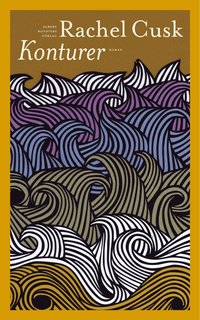Sometimes I read English books in Swedish translation out of personal (and I guess professional) curiosity. Is the experience any different? Will I pick up some new vocabulary, learn how to express a particular English sentiment that I still struggle with?
Other times I’m desperate to find any copy of a particular book and only Swedish is available, at which point the exercise is more pragmatic and akin to mental ambidexterity. (See The Jakarta Method.) Such was the case with Rachel Cusk’s Outline, or Konturer in Swedish. This was a selection for the local book club; by the time this post goes up, we’ll have already met for dinner and discussion. I needed a copy by a particular deadline and the Swedish was what was immediately available, so that’s what I went with.
The whole book plays out over just a few days. The narrator is a writer, Faye, an Englishwoman teaching a creative writing workshop in Athens. Most of the book consists of the stories other people tell her, presented in reported speech from Faye’s first-person perspective.
I also might have lied a little bit when I said I only read the Swedish because of availability. That is true, but I was also relieved to find out that the Swedish was more readily available because nothing about this book sounded appealing and because a friend whose taste I trust implicitly hated it. Yes, yes, let’s not judge a book by a cover, either literally or metaphorically, but silly to pretend I’m not influenced by other people’s opinions. Hence I was hoping that reading the Swedish would bypass everything my friend found tedious about the book and let me enjoy it regardless.
James Lasdun notes in his review in the Guardian that
…in funnelling all the characters’ stories through Faye’s very refined sensibility (there’s little direct speech), Cusk gives them all a certain high-polished sameness, at least at the purely verbal level. I can’t say that bothered me, but no doubt it will keep some readers from responding to the book as enthusiastically as I did.
And that is exactly what happened. All of these people had backgrounds not particularly different from each other (disappointed middle-aged parents, often divorcés), meaning that Cusk’s “high-polished sameness” made for extremely monotonous reading.
Outline also requires a huge suspension of disbelief that I’m frankly not willing to give a book if I’m not having a great time. People tell their entire life stories to strangers in the most unlikely environments: during flights, writing workshops, over dinner. These accounts are always eloquently and coherently presented in language that sounds like no conversation I’ve ever actually had with another human. Much is often given in reported speech or summarized by Faye, and when direct speech appears it doesn’t sound all that different from Faye’s own voice. The latter is maybe a fault with me—I no doubt still lack some nuance and sophistication in my ear for Swedish, so I might have missed the elegance of Rebecca Alsberg‘s translation in places—but it doesn’t make the actual structure of the book any less repetitive.
The only mildly interesting moment in the book comes in the last chapter, and I’m not sure if Cusk actually intended this to be self-reflexive commentary on the rest of the book or if she was just taken with the idea without realizing how it applied to what she was writing. On her last day in Athens, Faye runs into her replacement (they are staying in the same apartment provided by the hosting school), who tells Faye that she’s had the worst time trying to write since she was mugged. Instead of being able to properly write or read a story, she can only fixate on a one-word summary that essentially drains the narrative of all life. Her once-beloved Beckett, for example, she can now only think of as “meaninglessness.” This summarization fixation has also bled beyond literature and into real life, where she’s now facing a crisis of sorts after she realizes that her entire existence could be summarized merely as “Anne’s life.”
That’s all Outline is: a bunch of lives, summarized in more or less the same voice, with nothing interesting arising out of their interaction or juxtaposition. The comparison that comes to mind is Ten Women from Marcela Serrano (English translation by Beth Fowler). Both are a fairly disjointed collection of life stories anchored in the one person all of these people have in common, but at least in Ten Women the characters are from all walks of life (from a TV celebrity to an elderly sales clerk to a young computer science student) and each chapter is told from a different character’s perspective and in a different character’s voice. Moreover, their presentation together as a collection gives rise to a more coherent organizing principle than anything in Outline: we can see at once the huge gulfs in experience for all of these women, as well as the struggles they share, and the book functions as a fairly straightforward feminist critique of socio-economic conditions in Chile.
If there is any kind of organizing principle in Outline, it’s a much more banal and self-indulgent one: Faye is sad about her divorce. And since the book gives me no real reason to care that Faye is sad about her divorce, or to understand why it’s such a spectacular tragedy in the world of divorces, everything else collapses into a bunch of tedium.

